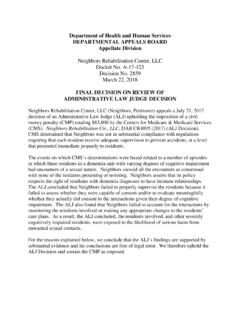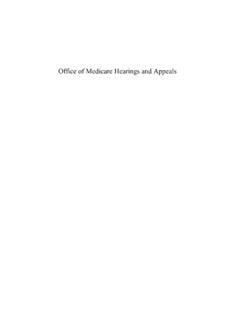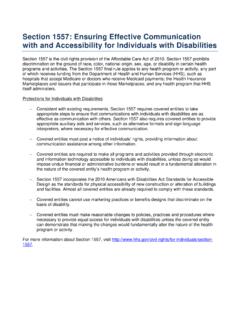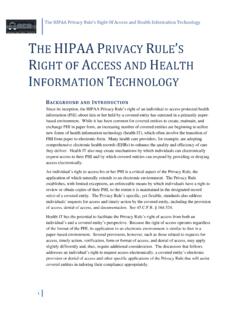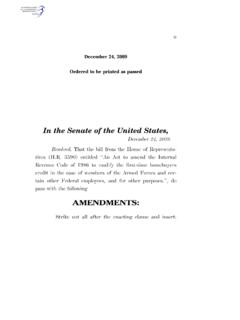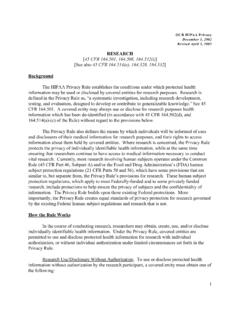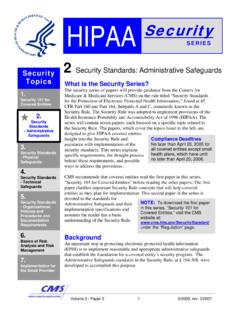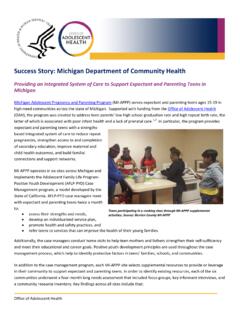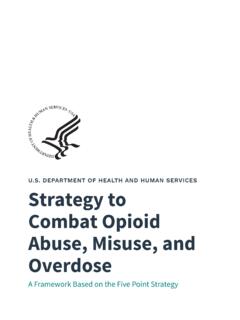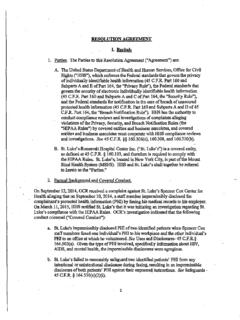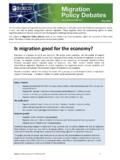Transcription of 2020 International Compilation of Human Research …
1 1 International Compilation of Human Research Standards 2020 Edition Compiled By: Office for Human Research Protections Department of Health and Human Services PURPOSE The International Compilation of Human Research Standards enumerates over 1,000 laws, regulations, and guidelines (collectively referred to as standards ) that govern Human subject protections in 133 countries, as well as standards from a number of International and regional organizations. First published in 2005, the Compilation is intended for use by researchers, IRBs/ Research Ethics Committees, sponsors, and others who are involved in Human subjects Research protections around the world. Content experts from around the world, listed at the end of the Compilation , provided updates (or confirmations of prior listings), which are reflected in the hundreds of changes entered into this Edition. Two new countries are featured in the 2020 Edition: Nicaragua and Paraguay. ORGANIZATION The Table of Contents is on pages 3-4.
2 For each country, the standards are categorized by row as: 1. General, , applicable to most or all types of Human subjects Research 2. Drugs, Biologics, and Devices 3. Clinical Trial Registries 4. Research Injury 5. Social-Behavioral Research (also see Description and Analysis of Social-Behavioral Research Standards: ) 6. Privacy/Data Protection (also see Privacy International reports: ) 7. Human Biological Materials 8. Genetic (also see the HumGen International database: ) 9. Embryos, Stem Cells, and Cloning These nine categories often overlap, so it may be necessary to review the other standards to obtain an accurate understanding of the country s requirements. The information is then organized into four columns: 1. Key Organizations include those groups that issue regulations or guidelines, or serve in a national oversight role for Human subjects Research . 2. Legislation encompasses statutes, statutory instruments, and legislative decrees, as well as any pertinent constitutional provisions.
3 3. Regulations refer to instruments that are created and issued in the name of governmental administrative bodies. 4. Guidelines pertain to non-binding instruments. 2 The year of the document s most recent version (or date of initial approval, if never amended) is indicated in parenthesis when that information is available, unless the date is part of the document s title, , Law No. 46/2018. HOW TO ACCESS A DOCUMENT Documents can be accessed in four possible ways: 1. Link to the web address (URL). 2. Search for a document at the website of the agency listed in the Key Organizations column. 3. Perform an Internet search on the document title. 4. Request a local Research ethics committee to provide the document. In many cases the documents are available in English. When the URL links to a non-English website or document, an online language translator usually can render an English version. TOPICS NOT COVERED In order to focus its scope, the International Compilation of Human Research Standards does not include standards from the state, provincial, or local levels.
4 Nor does the Compilation cover: 1. Enabling legislation, , laws that authorize an agency to promulgate Human subjects standards, but do not direct the content of those regulations. 2. Laws, regulations, or guidelines that are disease-specific or focus on Research integrity, clinical bioethics, product liability, clinical trial inspection procedures, intellectual property, good manufacturing practice, bioequivalence testing, or informed consent in clinical practice. 3. Ethics codes of academic, medical, or other professional organizations see the Ethics Codes Collection: 4. Working papers, drafts, commentaries, or discussion papers. NEW STANDARDS, UPDATES, AND BROKEN LINKS To request inclusion of a new standard in the Compilation or to report updates or broken links, contact . DISCLAIMER Although this Compilation contains information of a legal nature, it has been developed for informational purposes only and does not constitute legal advice or opinions as to the current operative laws, regulations, or guidelines of any jurisdiction.
5 In addition, because new standards are issued on a continuing basis, this Compilation is not an exhaustive source of all current applicable laws, regulations, and guidelines relating to Human subject protections. While in-country persons have been requested to review listings to assure their accuracy and completeness, researchers and other individuals should check with local authorities and/or Research ethics committees before commencing Research activities. 3 TABLE OF CONTENTS International .. 5 NORTH AMERICA .. 10 Canada .. 10 United States .. 12 EUROPE .. 21 Regionwide .. 21 Armenia .. 27 Austria .. 27 Belarus .. 29 Belgium .. 31 Bosnia and Herzegovina .. 33 Bulgaria .. 36 Croatia .. 39 Cyprus .. 41 Czech Republic .. 42 43 Estonia .. 44 Finland .. 46 France .. 48 50 51 Greece .. 55 Hungary .. 58 Iceland .. 60 Ireland .. 62 Italy .. 63 Latvia .. 65 Lithuania .. 67 Luxembourg .. 71 Macedonia .. 72 Malta .. 76 Moldova .. 77 Montenegro .. 79 Netherlands .. 81 83 Poland.
6 86 Portugal .. 88 Romania .. 89 Russia .. 90 San Marino .. 92 Serbia .. 92 Slovakia .. 94 Slovenia .. 94 Spain .. 98 Sweden .. 101 Switzerland .. 103 107 United Kingdom .. 109 ASIA/PACIFIC .. 116 Australia .. 116 Bangladesh .. 119 China, People s Republic 119 India .. 123 Indonesia .. 126 Japan .. 126 Kazakhstan .. 129 Korea .. 130 Kyrgyzstan .. 133 Malaysia .. 134 Myanmar .. 137 Nepal .. 137 New Zealand .. 138 Pakistan .. 140 Philippines .. 141 Singapore .. 144 Sri Lanka .. 146 Taiwan .. 147 Tajikistan .. 149 Thailand .. 149 Uzbekistan .. 150 Vietnam .. 150 MIDDLE EAST/NORTH AFRICA .. 152 Egypt .. 152 Iran .. 152 Israel .. 152 Jordan .. 153 Kuwait .. 154 Qatar .. 154 Saudi Arabia .. 155 Sudan .. 155 Tunisia .. 156 Turkey .. 156 United Arab Emirates .. 158 LATIN AMERICA AND THE CARIBBEAN .. 159 Regionwide .. 159 Argentina .. 159 Barbados .. 161 Bermuda .. 161 Bolivia .. 161 Brazil .. 162 Chile .. 167 Colombia .. 169 Costa Rica .. 172 Cuba .. 173 Dominica .. 173 Dominican Republic.
7 173 Ecuador .. 173 El Salvador .. 175 Grenada .. 176 Guyana .. 176 Guatemala .. 176 Haiti .. 177 Honduras .. 177 177 M xico .. 177 Panam .. 179 180 Per .. 180 Saint Lucia .. 181 Trinidad and Tobago .. 181 Uruguay .. 182 182 AFRICA .. 184 Regionwide .. 184 Algeria .. 184 Benin .. 184 Botswana .. 184 Burkina Faso .. 185 Cameroon .. 185 4 Congo, Democratic Republic of .. 186 C te-d'Ivoire .. 186 Ethiopia .. 186 Gambia .. 186 Ghana .. 187 Guinea .. 187 Kenya .. 188 Liberia .. 188 Madagascar .. 188 Malawi .. 189 Mali .. 190 Mozambique .. 190 Nigeria .. 190 Rwanda .. 191 Senegal .. 191 Sierra Leone .. 191 South Africa .. 192 Tanzania .. 193 Uganda .. 194 Zambia .. 194 Zimbabwe .. 195 ACKNOWLEDGEMENTS .. 197 Country Key Organizations Legislation Regulations Guidelines 5 International General Council for International Organizations of Medical Sciences (CIOMS): International Ethical Guidelines for Involving Humans (2016): International Committee of the Red Cross (ICRC): 1.
8 Geneva Convention Relativeto the Treatment of Prisoners ofWar, Articles 13 and 130(1950): 2. Additional Protocol IRelating to the Protection ofVictims of International ArmedConflicts, Article 11 (1977): Office of the United Nations High Commissioner for Human Rights (OHCHR): International Covenant on Civil and Political Rights, Article 7 (1976): TRUST Project: Global Code of Conduct for Research in Resource-Poor Settings (2018): UNAIDS: 1. Good Participatory Practice:Guidelines for Biomedical HIVP revention Trials (2011): 2. Ethical Considerationsin Biomedical HIV Prevention Trials(2012): Key Organizations Legislation Regulations Guidelines 6 tassets/documents/unaidspublication/2012 United Nations Educational, Scientific, and Cultural Organization, Bioethics Program (UNESCO): Universal Declaration on Bioethics and Human Rights (2005): World Health Organization: 1. Standards and Operational Guidancefor Ethics Review of Health-RelatedResearch with Human Participants (2011)2.
9 Ethical Issues in Patient SafetyResearch: Interpreting Existing Guidance(2013)3. Managing Ethical Issues in InfectiousDisease Outbreaks: Guidance Document(2016) Guidelines on Ethical Issues inPublic Health Surveillance (2017)Access: World Medical Association: Declaration of Helsinki (2013): Drugs, Biologics, and Devices Drugs International Conference on Harmonization (ICH): Integrated Addendum to ICH E6(R1): Guideline for Good Clinical Practice (2016): World Health Organization (WHO): 1. Handbook for Good Clinical ResearchPractice (GCP): Guidance forImplementation (2005): 2. Operational Guidance: InformationNeeded to Support Clinical Trials ofHerbal Products (2005)Devices International Medical Device Regulators Forum (IMDRF): IMDRF: Statement Regarding Use of ISO 14155:2011 Clinical Investigation of Medical Devices for Human Subjects-GeneralCountry Key Organizations Legislation Regulations Guidelines 7 Good Clinical Practice (2015): Archived Documents from the Global Harmonization Task Force (GHTF), replaced by the IMDRF in 2012: 1.
10 Clinical Evaluation (2007)2. Clinical Evidence Key Definitionsand Concepts (2007)3. Post-Market Clinical Follow-UpStudies (2010)4. Clinical Investigations (2010)5. Reportable Events During Pre-MarketClinical Investigations (2012)6. Clinical Evidence for IVD MedicalDevices (2012)7. Scientific Validity Determination andPerformance Evaluation (2012)8. Clinical Performance Studies for IVDM edical Devices (2012)Access: International Standards Organization: Clinical Investigation of Medical Devices for Human Subjects -- Good Clinical Practice. Standard Number 14155:2011: Clinical Trials Registry World Health Organization International Clinical Trials Registry Platform: Resolution WHA (2005): World Medical Association: Declaration of Helsinki, Article 35 (2013): International Committee of Medical Journal Editors: Clinical Trial Registration: Research Injury World Medical Association: Declaration of Helsinki, Paragraph 15 (2013): ,Biologics, and DevicesCountry Key Organizations Legislation Regulations Guidelines 8 cies/b3 International Conference on Harmonization (ICH): Integrated Addendum to ICH E6(R1): Guideline for Good Clinical Practice , Section (2016): Council for International Organizations of Medical Sciences: International Ethical Guidelines for Health-related Research Involving Humans (2016), Guideline 14: Social-Behavioral Research UNESCO: Code of Conduct and Ethical Guidelines for Social Science Research : Privacy/Data Protection World Medical Association.
